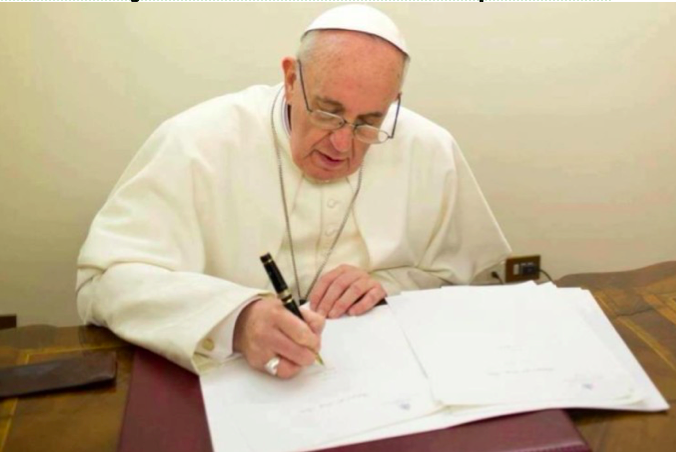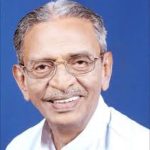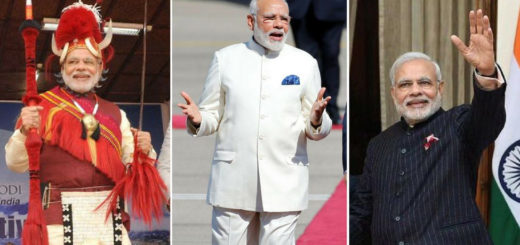Two documents from Rome: Stress on Unity, Equality, Universality among the followers of Lord Jesus

dr.james kottoor
 Given below are two historical documents:
Given below are two historical documents:
1. The recent one from Pope Francis of Oct. 9, 2017 sent to us by Kurian Joseph, who worked for it long in Delhi, now in California, USA
2. Instruction of the congregation for the oriental churches Concerning the request of some faithful of the Syro-Malabar Church residing in Delhi, “To be permitted to receive the sacraments in the Latin Church,” of 28 January 2016,Signed, by Leonardo Card. Sandri, Prefect and Cyril Vasil’, S.J.,Archbishop Secretary, sent to us by Dr. P.J.Antony.
It shows wide interest, especially in the Syromalabar community in the historical development of a long process to the present state of equality of all Rites and Churches. Besides both these documents are interlinked very closely and those who want to study them may wish also to have the two documents from the horses mouth. So we are presenting both below for the study of our brothers and sisters, generally referred to as "lay people”, rather pejeoratively occupying the last rung in the hierarchical ladder, like ‘Sudras’ in Indian Caste system.
The right name is “Community of the faithful” or more precisely “Church Citizens”, (Eph.2.19: "So you are no longer aliens or foreign visitors: you are citizens like all the saints, and part of God's household"), equal to every one, that is, neither above nor below anyone, variously called, laity, religious, priest, bishop or Pope due to their charisms and office for the time being or “pro tempore existente” as they say in ecclesiastical language in Latin.
It is therefore advisable that our readers keep these two documents, as they will be needed for reference many times in future when controversial discussions occur. They are sure to occur. Truth is ONE, namely, Equality of the followers of Jesus as in the CATTLE CLASS – but opinions about it are bound to be different, complementing one another or hurting one another. Here the teaching of St. Augustine: “Unity in necessary things, differences in unnecessary things and charity in all things” should help us to guide our journey as citizens of the household of God here below. james kottoor, editor, ccv).
Please read below the two documents!
Letter of the Holy Father Pope Francis
to the Bishops of India
Dear Brother Bishops,
1. The remarkable varietas Ecclesiarum, the result of a long historical, cultural, spiritual and disciplinary development, constitutes a treasure of the Church, regina in vestitu deaurato circumdata variegate (cf. Ps 44 and Leo XIII, Orientalium Dignitas), who awaits her groom with the fidelity and patience of the wise virgin, equipped with an abundant supply of oil, so that the light of her lamp may enlighten all peoples in the long night of awaiting the Lord’s coming. This variety of ecclesial life, which shines with great splendour throughout lands and nations, is also found in India.
The Catholic Church in India has its origins in the preaching of the Apostle Thomas. It developed through contact with the Churches of Chaldean and Antiochian traditions and, from the sixteenth century onward, through the efforts of Latin missionaries. The history of Christianity in this great country thus led to three distinct sui iuris Churches, corresponding to ecclesial expressions of the same faith celebrated in different rites according to the three liturgical, spiritual, theological and disciplinary traditions. Although this situation has sometimes led to tensions in the course of history, today we can admire a Christian presence that is both rich and beautiful, complex and unique.
2. It is essential for the Catholic Church to reveal her face in all its beauty to the world, in the richness of her various traditions. For this reason the Congregation for the Oriental Churches, which celebrates its centenary year, having been established through the farsightedness of Pope Benedict XV in 1917, has encouraged, where necessary, the restoration of Eastern Catholic traditions, and ensured their protection, as well as respect for the dignity and rights of these ancient Churches.
3. The Second Vatican Council embraced this vision of the Church and reminded the faithful of the need to protect and preserve the treasure of the particular traditions of each Church. “Moreover, within the Church particular Churches hold a rightful place; these Churches retain their own traditions, without in any way opposing the primacy of the Chair of Peter, which presides over the whole assembly of charity (cf. Ignatius of Antioch, Ad Rom., Praef.), and protects legitimate differences, while at the same time assuring that such differences do not hinder unity but rather contribute toward it” (Lumen Gentium, 13).
4. As Lumen Gentium teaches, it is for the Bishop of Rome to promote unity in the diversity of the Body of Christ. In this task, the Roman Pontiffs faithfully interpret and apply the voice of the Second Vatican Council, which expressed the ardent desire that the Oriental Churches, venerated for their antiquity, should “flourish and with new apostolic vigour execute the task entrusted to them” (Orientalium Ecclesiarum, 1). Their responsibility is not only to become ever more effective instruments of that “special duty of promoting the unity of all Christians, especially Eastern Christians” (Orientalium Ecclesiarum, 24), but also to promote their “equal dignity […] for they enjoy the same rights and are under the same obligations, also in respect of preaching the Gospel to the whole world” (Orientalium Ecclesiarum, 3). Thirty years ago, my beloved predecessor Saint John Paul II wrote a Letter to the Bishops of India. Drawing on the Second Vatican Council, he sought to apply the conciliar teaching to the Indian context. In India, even after many centuries, Christians are only a small proportion of the population and, consequently, there is a particular need to demonstrate unity and to avoid any semblance of division. Saint John Paul II also stated that the need for unity and the preservation of diversity are not opposed to one another: “This need to be faithful to the 2 traditions and patrimony of one’s own rite must not be interpreted as an interference with the Church’s task of ‘gathering into one the children of God who are scattered abroad’ (Jn 11:52) or with the mission of the Church to promote the communion of all people with the Redeemer” (Epistula ad Indiae Episcopos, 28 May 1987).
5. Five decades ago, when the Syro-Malabar Church expanded to some central and northern parts of India with “missionary eparchies”, it was generally thought by the Latin Bishops that there should be just one jurisdiction, that is, one bishop in a particular territory. These eparchies, created from Latin dioceses, today have exclusive jurisdiction over those territories, both of the Latin and Syro-Malabar faithful. However, both in the traditional territories of the Eastern Churches, as well as in the vast area of the so-called diaspora (where these faithful have long been established), a fruitful and harmonious cooperation between Catholic bishops of the different sui iuris Churches within the same territory has taken place. This cooperation not only offers an ecclesiological justification for such a solution, but also demonstrates its pastoral benefits. In a world where large numbers of Christians are forced to migrate, overlapping jurisdictions have become customary and are increasingly effective tools for ensuring the pastoral care of the faithful while also ensuring full respect for their ecclesial traditions.
6. In India itself, overlapping jurisdictions should no longer be problematic, for the Church has experienced them for some time, such as in Kerala. Saint John Paul II’s Letter authorized the erection of a Syro-Malabar eparchy in the Bombay-Pune region, which became the Eparchy of Kalyan. In 2012 the Syro-Malabar Eparchy of Faridabad was erected in the region of Delhi and its neighbouring states, while the boundaries of the Eparchy of Mandya were extended in 2015 to include the metropolitan area of Bangalore. In the same year, an Eparchy and an Apostolic Exarchate were erected for the Syro-Malankar faithful, so that by these ecclesiastical circumscriptions the Syro-Malankar Church could provide pastoral care for its faithful throughout the territory of India. All these developments show that, albeit not without problems, the presence of a number of bishops in the same area does not compromise the mission of the Church. On the contrary, these steps have given greater impetus to the local Churches for their pastoral and missionary efforts.
7. In 2011 my predecessor Benedict XVI wished to provide for the pastoral needs of the SyroMalabar faithful throughout India, and I confirmed his intention following the plenary session of the Congregation for the Oriental Churches in 2013. Archbishop Raphael Thattil is currently the Apostolic Visitor for those Syro-Malabar faithful in India who live outside their own territory, and he has provided detailed reports to the Apostolic See. This issue has been examined in meetings at the highest levels of the Church. Following these steps, I believe the time is now right to complete this process. I have therefore authorized the Congregation for the Oriental Churches to provide for the pastoral care of the Syro-Malabar faithful throughout India by the erection of two Eparchies and by the extension of the boundaries of the two already in existence. I decree also that the new circumscriptions, as with those already in existence, be entrusted to the pastoral care of the Major Archbishop of Ernakulam-Angamaly and to the Synod of Bishops of the Syro-Malabar Church, according to the norms of the Code of Canons of the Eastern Churches.
8. I hope that my decision will be welcomed with a generous and peaceful spirit, although it may be a source of apprehension for some, since many Syro-Malabars, deprived of pastoral care in their own rite, are at present fully involved in the life of the Latin Church. I am convinced, however, that all those involved will understand that there is no need for concern: the Church’s life should not be disrupted by such a provision. Indeed it must not be negatively interpreted as imposing upon the faithful a requirement to leave the communities which have welcomed them, sometimes for many generations, and to which they have contributed in various ways. It should rather be seen as an invitation as well as an opportunity for growth in faith and communion with their sui iuris Church, in order to preserve the precious heritage of their rite and to pass it on to future generations. There is already an instruction by the Congregation for the Oriental Churches to the Eparchy of Faridabad, which indicates that a member of the Syro-Malabar faithful, by virtue of the same law, is also a member of the SyroMalabar parish where he or she is domiciled (Code of Canons of the Eastern Churches, Can, 280 §1); yet at the same time, he or she can remain fully involved in the life and activities of the parish of the Latin Church. No dispensation is required from the law currently in force for the faithful to practice their faith serenely, and they may do this with the pastoral care of either Latin or Syro-Malabar pastors (cf. Prot. No. 197/2014, 28 January 2016).
9. The path of the Catholic Church in India cannot be that of isolation and separation, but rather of respect and cooperation. The presence of several bishops of the various sui iuris Churches in the same territory will surely offer an eloquent witness to a vibrant and marvellous communion. This is the vision of the Second Vatican Council, which I quote once again: “Between all the parts of the Church there remains a bond of close communion whereby they share spiritual riches, apostolic workers and temporal resources. For the members of the people of God are called to share these goods in common, and of each of the Churches the words of the Apostle hold good: ‘According to the gift that each has received, administer it to one another as good stewards of the manifold grace of God’ (1 Pet 4:10)” (Lumen Gentium, 13). It is in this spirit that I urge all the beloved Churches in India to be generous and courageous as they witness to the Gospel in the spirit of fraternity and mutual love. For the Syro-Malabar Church, this continues the valued work of their priests and religious in the Latin context, and sustains their availability for those Syro-Malabar faithful who, although choosing to attend Latin parishes, may request some assistance from their Church of origin. The Latin rite Church can continue to generously offer hospitality to members of the Syro-Malabar communities who do not have church buildings of their own. The cooperation among all the sui iuris Churches should continue, for example in the area of retreats and seminars for clergy, Bible conferences, celebrations of common feast days and ecumenical endeavours. With the growth of spiritual friendship and mutual assistance, any tension or apprehension should be swiftly overcome. May this extension of the pastoral area of the Syro-Malabar Church in no way be perceived as a growth in power and domination, but as a call to deeper communion, which should never be perceived as uniformity. In the words of Saint Augustine, who sang the praises of the Trinity and of the wonderful communion of the Father, the Son and the Holy Spirit, I also ask you: dilatentur spatia caritatis (Sermon 69, PL 5, 440.441). May there be a growth in love, communion and service.
Dear brother Bishops, I commend all of you to the intercession of the Blessed Virgin Mary and I assure you of my closeness in prayer. To all of you, the Church and the faithful in India, I impart my Apostolic Blessing, and I ask that you pray for me.
From the Vatican, 9 October 2017
FRANCIS
Congregatio Pro Ecclesiis Orientalibus PRO No. 197/2014
Instruction of the congregation for the oriental churches Concerning the request of some faithful of the Syro-Malabar Church residing in Delhi, To be permitted to receive the sacraments in the Latin Church
For many years, the Archdiocese of Delhi has generously provided for the pastoral care of the Syro-Malabar faithful living within the confines of that ecclesial circumscription. Consequently, it is not surprising that some members of this Oriental Church, having lived for a long time in a Latin ecclesial context, should experience a sense of disorientation after the erection of the Eparchy of Faridabad of the Syro-Malabar faithful. Nevertheless, the situation can be happily managed, even within the framework of existing law, if all concerned act with mutual understand and respect.
In the first place it could be useful to recall a few juridical points of reference. There does not exist a general right to choose one’s rite; rather, there is a duty to follow one’s own rite insofar as possible (cfr. CCEO can.40 §3 and can.35). However, situations arise in which the request to pass to another Church suiiuris is comprehensible. In the case at hand, the Bishops concerned are ready to facilitate the passage for anyone desiring it, and the assent of the Apostolic See may be presumed (cfr CCEO can.32 §2). Care should be taken to register all such transfers accordingly to CCEO can.37.
Some faithful of the Syro-Malabar Church, who experience difficulties participating in the parish of their own Church sui iuris, do not wish to pass over the Latin Church: this is most understandable and even praiseworthy, in the light of what has been recalled above. Such persons may exercised their right to participate in the liturgical functions of any church sui iuris (cfr. CCEO can.403 §1, CIC can.923). The Code of Canon Law of the Latin Church emphasises that the custom of receiving the sacraments in a given Church sui iuris does not imply ascription to it (CIC can.112 §2).
Consequently, a Syro-Malabar faithful, who, in force of the law itself, is a member of the Syro-Malabar parish where he has domicile (CCEO can. 280 §1), can remain fully involved in the life and activities of eh parish of the Latin Church. Both the pastors are called to understand the delicate situation of such persons and to facilitate the tranquil and serene prosecution of their life of faith.
In practice, this requires that the Latin pastor, who substitutes for the faithful’s legitimate pastor, fulfil what is established by law for the following sacraments: baptism, confirmation and marriage. For baptism, the Latin pastor will request permission from the Oriental pastor (cfr. CCEO can.677 §1, 678 and 683). The registration of the baptism is to be made in the Baptismal Register of the Latin parish, specifying the membership in the Syro-Malabar Church. Moreover, the Latin pastor will send to the Oriental pastor a certificate of the baptism for notification. The same process regards confirmation. As for marriage, the Latin pastor is the competent minister as long as one of the two parties is Latin. If, instead, the marriage concerns two Orientals, the Latin pastor will request delegation ad validitatem from the Oriental pastor. In the case of mixed marriage or disparity of cult, the competent Hierarch is the Oriental. In all these cases, the Latin pastor will send a notification to the Oriental pastor. Such inner-ecclesial collaboration should take place with respect, solicitude and promptitude, having the spiritual good of the faithful as the final goal.
The Members of the Synod of Bishops of the Syro-Malabar Church will ask of their Priests the same spirit of willing collaboration whenever a Syro-Malabar faithful who frequents a Latin parish in Delhi request or participates in the above- mentioned sacraments in Kerala. Documentation based upon the register (e.g. “free state certificate”) will be accepted from either the Syro-Malabar pastor or the Latin Pastor of the place of baptism. If other attestations are needed (for example, that the person is currently practicing), these should be given by the Latin pastor of the parish frequented by the individual.
In sum, the faithful ascribed to the SM church residing in the territory of the Eparchy of Faridabad are subject to the Eparchial Bishop of that ecclesial Circumscription, even if, in practice, they frequent Latin parishes. Nonetheless, let them rest assured that their situation is understandable and their motivations respected. All should take care so that these persons do not feel excluded from full involvement in the Latin parish or slighted by the SM parish. On their part, a joyful acceptance of the ecclesial norms is requested, for these serve to foster the harmonious coexistence of the faithful of the various sui iuris Churches in India.
This Congregation, keeping in mind the necessities of the faithful and observing the current canonical norms, confident of the pastoral solicitude of the Pastors, both the Latin and Syro-Malabar, considers it neither necessary nor opportune to grant particular indults of a general character.
Vatican City, 28 January 2016
Signed: Leonardo Card. Sandri, Prefct
Signed: Cyril Vasil’, S.J.,Archbishop Secretary
















